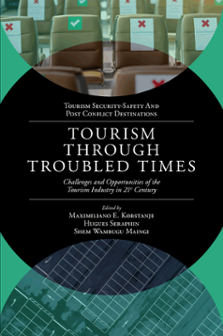
Index
Tourism Through Troubled Times
ISBN: 978-1-80382-312-6, eISBN: 978-1-80382-311-9
Publication date: 23 September 2022
Citation
(2022), "Index", Korstanje, M.E., Seraphin, H. and Maingi, S.W. (Ed.) Tourism Through Troubled Times (Tourism Security-Safety and Post Conflict Destinations), Emerald Publishing Limited, Leeds, pp. 271-276. https://doi.org/10.1108/978-1-80382-311-920221016
Publisher
:Emerald Publishing Limited
Copyright © 2022 Maximiliano E. Korstanje, Hugues Seraphin and Shem Wambugu Maingi. Published under exclusive licence by Emerald Publishing Limited
INDEX
- Prelims
- Tourism Through Troubled Times: Emerging Issues and New Pathways for the 21st Century Tourism
- Chapter 1 A Problem Called Alterity: The Position of the ‘Other’ in HBO Saga Westworld
- Chapter 2 Digital Skills and Tourism Workforce Recovery in the Post-COVID-19 Pandemic Era: Case of Small and Medium-Sized Tourism Enterprises (SMTEs) in Nairobi, Kenya
- Chapter 3 A Perennial State of Crisis Management at a Tourism Destination in the Global South: The Case of South Africa
- Chapter 4 Tourism, Co-Location and Networking: A Haitian Contemporary Crisis and Future Prospects
- Chapter 5 Surfing in the Dark: Comparable Study Cases Between Ground Zero, US and Republica de Cromañón, Argentina
- Chapter 6 The Perceptions of Anti-COVID-19 Practices, Experience, Satisfaction and Behaviour in Tourist Accommodations in Canary Islands
- Chapter 7 COVID-19: An Opportunity to Theorise (Online) Teaching Practices in Tourism and Related Topics
- Chapter 8 Pandemic Recovery Strategies: A Disaster Management Tourism Framework
- Chapter 9 Digitalisation in Latin America and the Caribbean Hotel Sector in a Post-Pandemic Environment
- Chapter 10 Sustainability Perspectives of the Wildlife Conservancy–Based Tourism Model in a Post-Pandemic Context in Kenya
- Chapter 11 The Effect of COVID-19 Pandemic on Russian Tourists' Demand and Preferences
- Chapter 12 Impacts and Adaptive Strategies of the Hotel Sector Amid the COVID-19 Pandemic: A Case Study of the Hotel Sector in the Siem Reap Province
- Chapter 13 Crisis Management and Resilience – The Case of Small Businesses in Tourism
- Index